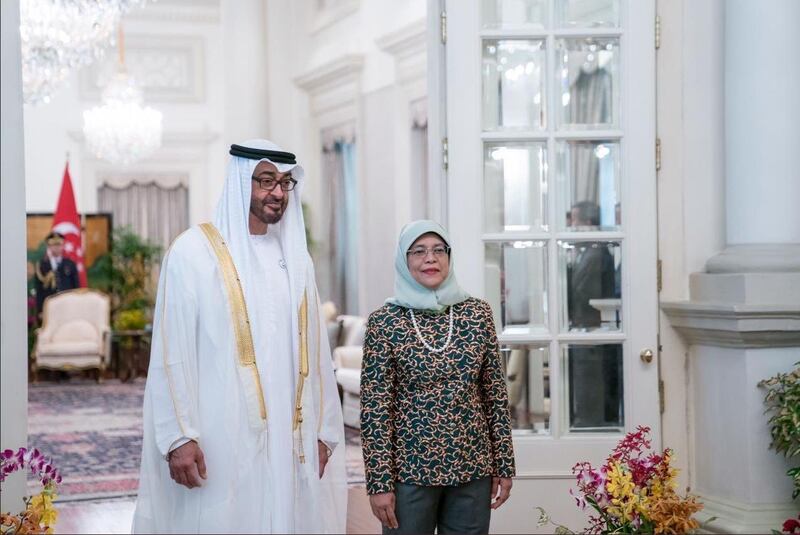They are separated by an ocean and nearly 6,000 kilometres, but the UAE and Singapore have more in common than one may think.
This week, Singapore's former deputy prime minister Tharman Shanmugaratnam was elected president.
The 66-year-old economist beat two rival candidates with 70.4 per cent of the vote, the Elections Department declared on Friday.
"I declare Mr Tharman Shanmugaratnam as the candidate duly elected as the president of Singapore," said election returning officer Tan Men Dui.
It has been three years since President Sheikh Mohamed, then Crown Prince of Abu Dhabi, made a visit to Singapore on an official visit to meet its leader to strengthen ties between the nations.
It is not hard for someone living in the UAE to feel at home in Singapore.
Its futuristic skyline is reminiscent of Dubai's, and Abu Dhabi's unmissable Gate Towers is the double of Singapore's Marina Bay Sands resort, with its three towers topped by the world's largest cantilever platform.
Both structures are symbolic of the modern, forward-thinking economies that built them.
According to the latest Henley Passport Index, Singapore now has the world's most powerful passport, giving its citizens visa-free access to 192 countries.
Who did it overtake? Japan and the UAE, the latter of which climbed three places from last year to rank as the 12th most powerful passport.
Both countries also have a highly diverse population.
Like the UAE, a large percentage of Singapore's inhabitants are not citizens – about 25 per cent.
The island city state is predominantly ethnic Chinese, with Malays and Indians also major population groups. It has four official languages: English, Malay, Mandarin and Tamil.
While Arabic is the official language of the UAE, English is widely used and spoken, including in the court system, where Hindi will also soon have official status. This diversity of language, culture and even cuisine is a reflection of the recent history of both countries.
Like the seven emirates of the UAE, Singapore was in the past subject to British control of its foreign affairs.
One legacy of this British presence is that both countries use electric plugs that have three flat rectangular pins, known as Type G.
Arabs, mostly of Yemeni origin, settled in Singapore from the 1820s and played a major role in the colonial economy. They number about 10,000 today.
Singapore is one of the world's most densely populated places, and both countries experienced enormous population growth over the past 50 years.
Singapore's population has risen from 1.6 million in the 1960s to nearly six million today, while the UAE's growth has been even more dramatic, from about 250,000 in 1971 to 9.5 million, according to the most recent government figures.
In economic terms, the countries have a similar GDP.
According to the World Bank, the UAE ranked 32nd in the world for GDP in 2023, at $507.53 billion (Dh1.8 trillion), with Singapore at $397bn, which is expected to reach $473.79bn by the end of the year.
Both countries see themselves as natural transport and trading centres for the 21st century.
Like Jebel Ali and Khalifa Port, the Port of Singapore is crucial to the country's economic well-being.
The UAE is Singapore's biggest trading partner in the Middle East.
Where the future is concerned, both countries are placing increasing importance on developing new technologies, with Singapore and Dubai seeking to become the world’s first smart cities.
In the eyes of the world, Singapore and the UAE are often thought of as desirable places to live and visit.
Singapore Airlines is regularly voted the best in the world, but faces frequent challenges from Emirates and Etihad.
Both countries rank highly where safety and security are concerned, and have a reputation for luxury, comfort and, of course, shopping.







